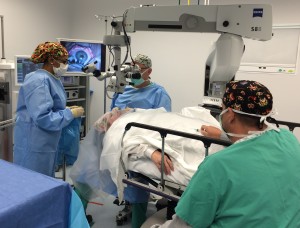What is a Cataract?
Cataracts are a natural part of the aging process. As we age, our natural lens that gives us the ability to see things clearly becomes cloudy over time. As the lens becomes cloudy you may notice some of the following symptoms in your vision:
Symptoms of Cataracts:
- Blurred or Double Vision
- Glare, halos, or light sensitivity
- Difficulty seeing at night
- Double vision in one eye
- Difficulty reading
- Fading or yellowing of colors
- Vision that worsens in sunlight
- Poor depth perception
Causes of Cataracts:
- Age
- Eye Trauma
- Heredity
- Diabetes
- Ultraviolet Radiation
- Smoking
- Glaucoma
- Certain Medications
- Some medications including long-term use of Oral steroids
How is a Cataract treated?
Currently there is no medical treatment to reverse or prevent the development of cataracts. Cataract surgery is the only way to regain your clear vision. With surgery, the cloudy lens is removed and replaced with an artificial intraocular lens implant. Cataract surgery is a highly successful procedure. In 95% of all cases clear vision is achieved. With the advances in today’s technology the surgery is performed as an outpatient procedure and takes only minutes. If your symptoms are affecting your everyday activities, a cataract should be treated.
With today’s advances in technology there are several options when it comes to the intraocular lens implants. The two most common lens implants we use are the
Traditional Monofocal Lens and the
Multi-focal Lens.
The
Monofocal lens provides clear vision at a single distance. Depending on the patients visual acuity the Monofocal lens can be calculated for near vision or for distance vision. A majority of our patients prefer to correct their distance vision therefore needing to correct their near vision with glasses. Patients also find that the traditional Monofocal lens is more affordable since insurance pays all fees, less deductibles or copays.
The
Multifocal lens allows patients to see near, far and everything in between. It can provide clear, sharp vision for reading, using the computer, cooking, and driving; basically, all of your daily activities without the need for glasses or contacts. Unfortunately, not everyone is a candidate for the Multifocal lens and is not fully covered by insurance leaving you with a larger out of pocket expense. However, many patients find it worth the extra cost due to the chance of becoming spectacle independent.
Dr. Smith will discuss with you if surgery is recommended and the type of intraocular lens that will best suit your daily needs.
